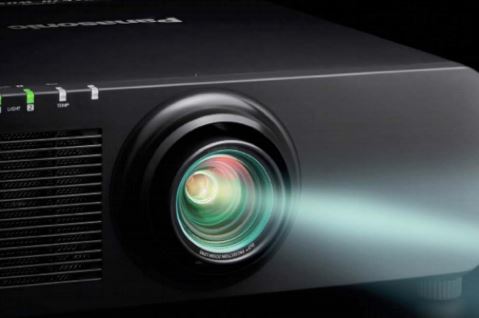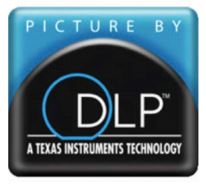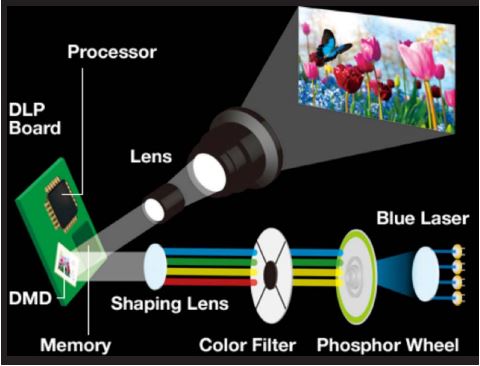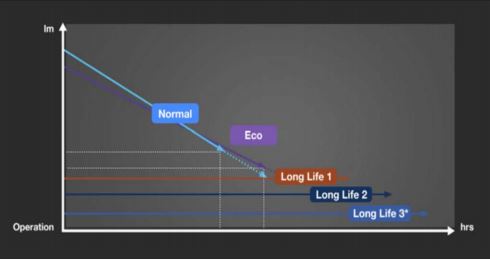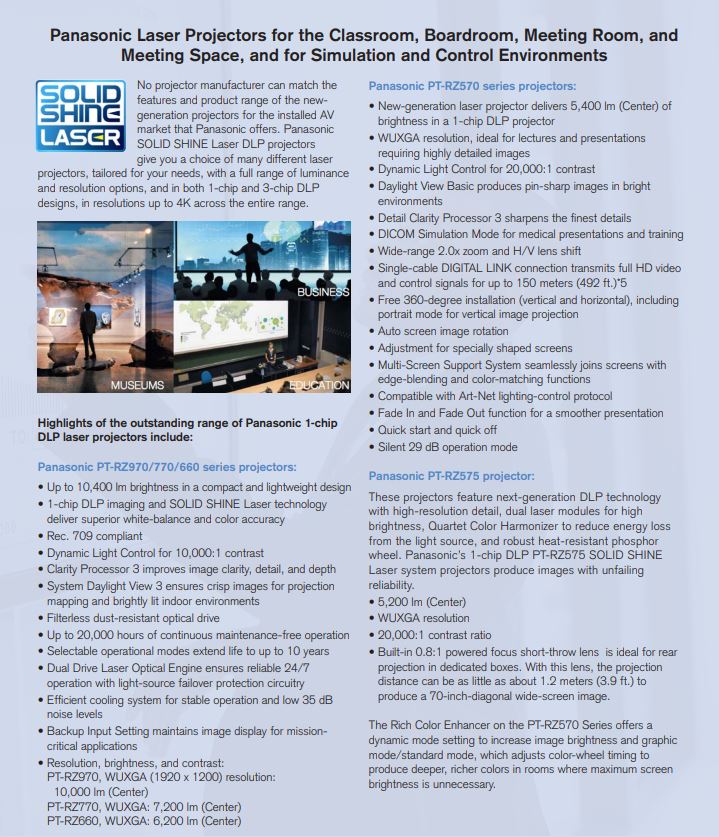September 4, 2018
12 min read
Advanced platforms and features separate the “me-too” laser projectors that are flooding the market from the high-performing projectors that are being spec’d in by the most demanding and ROI-conscious AV integrators and end users. Written in collaboration with AVTechnology, this whitepaper will get you up-to-speed on the most cutting-edge laser projector features and help you […]
Read WhitepaperAdvanced platforms and features separate the “me-too” laser projectors that are flooding the market from the high-performing projectors that are being spec'd in by the most demanding and ROI-conscious AV integrators and end users.
Written in collaboration with AVTechnology, this whitepaper will get you up-to-speed on the most cutting-edge laser projector features and help you distinguish the best choice for your application in an inundated market.
INTRODUCTION
The TCO (total cost of ownership) arguments for using solid-state video projectors (instead of conventional lamp-based projectors) for installed AV applications are compelling: because the new-generation projectors are “lamp-free, there are no lamp replacement costs over the life of that projector. And the market has spoken: the best, most popular, most robust lamp-free projectors today are laser-phosphor projectors— now commonly called “laser projectors.” But AV integrators and AV end users are learning that not all laser projectors are created equal. The best new-generation laser projectors do far more than just providing better TCO with a lamp-free design. Only by choosing a projector that’s based on the latest advances in engineering can you be sure that you’re future-proofing your AV installation for years to come, and not just getting another “me-too” laser projector. This white paper outlines the advanced features that separate the flood of me-too laser projectors from the technology and business case-leading projectors that are being spec’d in by the most demanding and ROI-conscious AV integrators and end users.
The best projectors for the classroom, boardroom, meeting room, and any installed AV application must have key new-generation features that deliver not just better TCO but superior image quality, state-of-the-art engineering, installation options, and networking performance.
BEYOND TCO—TOWARD A NEW PROJECTION PARADIGM
The reign of the video projector as the display tool of choice for the classroom, boardroom, meeting space—and indeed any installed AV space that requires a flexible imaging platform—has been a long one. Even after the introduction of flat-panel displays into the market, video projectors continue to deliver much greater brightness and higher resolution options, larger screen size options, more configuration options, greater flexibility, and many other advantages. But throughout their reign, projectors have continued to evolve—from the low-resolution, limited-light-output, maintenance-heavy units of yesterday to today’s high lumen lower TCO, more reliable, and better performing units. However, the sheer quantity of projection manufacturers and models available for the installed AV market has exploded over the years, leading to confusion and many ostensibly similar options.
Today, with the proliferation of laser projectors, an inexperienced AV integrator or end user may think, “the choice is now simple: lamp-based projectors mean too many lamps to buy down the road, LED projectors don’t have the lumens I need, nor do the ‘hybrid’ projectors … so I’ll just pick a laser [phosphor] projector, and we’re good to go.” Smart integrators and projection users know that costly mistakes lie down that road—namely, performance, TCO, quality, and reliability shortfalls in a few short months or years after the initial purchase. Those mistakes can consume both limited budgets and manpower. Smart integrators know that choosing the best laser projector is not just about the “lamp-free” TCO math. The best projectors for the classroom, boardroom, meeting room, and any installed AV application must have key new-generation features that deliver not just better TCO but superior image quality, state-of-the-art engineering, installation options, and networking performance. Those features include:
• A DLP-based laser-light engine that avoids the compromises and performance limitations of LCD-based laser projectors. The market has spoken: DLP is widely regarded as the superior display technology for image quality, longevity, and reliability. DLP projectors can reproduce deep blacks and a more accurate white balance than LCD projectors. And they can better support the higher color gamut needed for 4K and UHD, as well as for high-contrast HD.
• A dust-resistant airtight optical block design that prevents brightness degradation and ensures long maintenance-free and dependable operation (not just for the illumination system but for the entire projector).
• Highly efficient cooling systems, which ensure stable 24/7 operation. These include unique liquid-cooling and heat-pipe cooling systems that enable the DMD module(s) to keep images crisp and bright while reducing fan speed and lowering noise levels (and thereby minimizing distractions in quiet classrooms [and meeting rooms)
• Flexible installation options such as Panasonic’s DIGITAL LINK(HDBaseT) and built-in connectivity that supports the transmission of uncompressed full HD video and control commands through a single CAT5e or higher STP cable for distances up to 150 meters (492 ft.), allowing you to save on the cost of peripheral connectivity systems.
• Enhanced flexibility due to 360-degree, omnidirectional installation capabilities, software that expands image-adjustment functionality, and wide range of compatible lenses.
The advances made by Panasonic over recent years reflect the key advances in projection technology—and those advances are the very performance features now expected by the most demanding AV professionals.
Panasonic was the first company, in 2004, to come to market with a wireless projector. In 2005, Panasonic announced the first 1-chip DLP projector brighter than 5,000 lumens. Panasonic holds 319 patents in projection technology in the United States and 837 globally, and the list of innovations goes on. Fast forward to the recent projection landscape, and in 2013 Panasonic raised the bar to a new level with the introduction of its next-generation laser Solid Shine™ line of projectors. No projector manufacturer today can match the projection technology that Panasonic offers. The proof is in the real world of installed AV, where AV integrators and demanding end users push projectors to their performance limits daily—with exceptional results.
“The AV integrators are the ones driving the projection technology evolution, through feedback and constant input to our design team,” says John Meehan, sales engineer at Panasonic. Meehan, who works with top AV system designers nationwide, says that laser projector features such as instant on-off are now expected. It’s now about the next level of performance.
“AV integrators are driving the projection technology evolution through ongoing feedback to our design team,” says John Meehan, sales engineer at Panasonic. Meehan, who works with top AV system designers nationwide, says that laser projector features such as quick on-off and portrait mount capability are to be expected, so it’s now about the next level of performance. The difference is in the details, and the story is that all laser projectors are not created equal.
“Projector shootouts are meaningful again” says Meehan, “We hear it from our AV integrators and users. Panasonic laser projectors look better overall—Brighter and more colorful images with better blacks and more neutral, pleasing whites.”
“We’ve seen whitepoints get pushed toward green to achieve the brightness specs, but this distorts the color gamuts, which also vary quite a bit more than you’d expect in terms of the RGB chromaticities. We’ve included an internal color sensor circuit that monitors and maintains the proper RGB levels and therefore the whitepoint, in our projectors as they age.”
“We hear it from our AV integrators and users. Panasonic laser projectors look better overall — Brighter and more colorful images with better blacks and more neutral, pleasing whites.”
— John Meehan, Sales Engineer, Panasonic
“And all of our laser models include advanced features such as 7-Color matching controls, edge blending, geometric correction controls for H&V keystone, corner correction, and curved screens. Also there are six control options available, including the emulation of our competitor’s serial command codes.”
“Sealed optics with heat-pipe cooling of the DMD chips enables long-term and low-maintenance operation. This has been borne out by dust chamber simulation testing to ASHRAE specs to simulate 20,000 hours of use in classroom and office environments.”
For the nationally known, Washington, DC-based, AV integrator CTSI, the shift to using solid-state laser projectors for both their corporate and high-end government installations is in full swing, according to AV engineering manager Mike Wilson. CTSI designs and installs projection technology for some of the most sophisticated corporate boardrooms and meeting spaces, healthcare facilities, houses of worship, educational facilities, training spaces, sports stadiums and arenas, museums, and military facilities. But the shift is not just about laser projection; it’s also about what projectors they choose.
“We are a very strong Panasonic partner,” says Wilson. “They have a complete line of laser projectors, from 3,500 lumen all the way to 35,000 lumen. That’s important because with Panasonic specifically we know that we can get the same quality with 1-chip and 3-chip DLP. They have that full lumen range, and they have the color range—1-chip or 3-chip, depending on the application— so we know that whether we’re doing a boardroom, a divisible conference room, or a simulator, for example, we’re choosing well. It’s really easy for me to choose Panasonic—the range of projectors goes up all the way—lumens, resolution, and more. We use the 35,000 lumen Panasonic for a high-school auditorium or a house of worship—and we use a 4K there as well.”
Wilson says he educates his customers about the fact that Panasonic was the first to come to the market with laser projectors, and that experience translates into a larger number of deployed units in use today.
“The number of Panasonic projectors that just our company alone has installed is formidable. And, more importantly, we’ve had zero warranty calls on those. We’ve never had a service call from a failed projector. And with the range of projectors from Panasonic, it’s important to us that the lenses are compatible among their models. That makes our life easier.”
For CTSI’s demanding customers, details of projector specs and projector performance matter. They aren’t just specs—they translate directly to the bottom line in the form of satisfied customers and minimized maintenance costs.
“We—and our customers—find that Panasonic’s projectors are quieter compared to those of their competitors. For one, they designed their chassis specifically for laser phosphor—they didn’t just put the LP into the old chassis. You can tell the difference. For example, CTSI is doing a lot of simulators for a defense contractor. One of the applications is a ‘tower simulator’—that is, a flight control tower simulator. We’ve discovered we can hang the Panasonic laser projectors in different ways, like mirror bounces for rear projection. The Panasonic projectors have mounting features that make that easy.”
And beyond the performance specs of individual projectors, installed AV is also about networking and about a changing integration landscape.
A TECHNICAL ROADMAP FOR FUTURE-PROOFING YOUR PROJECTION CHOICES
DLP: The Heart of the Superior Projection Technology Platform
It all starts with DLP: the preferred technology for those seeking the best new-generation projectors. LCD projectors have always had high maintenance costs because the heatgathering LCD panels have to be cooled so aggressively. Since LCD is a transmissive, and not a reflective, technology like DLP, the LCD panels absorb heat—a deal-killer for panel longevity and so projector longevity as well. And the DMD chip at the heart of DLP is all about image quality and longevity. LCD panels fade over time and need to be replaced. And a high-quality single-chip DLP projector with a 3x speed color wheel is intrinsically convergent, as opposed to 3-chip LCD systems, since the same device draws up R, G, and B. On the other hand, a laser-phosphor engine in concert with a color wheel is simply splitting color, with no adverse corollary effects. As a result, a 1-chip DLP laser-phosphor projection such as Panasonic’s yields the best image processing by delivering the same image quality, without artifacts, as a 1-chip UHD lamp-based projection.
And for the best image contrast—the technical limitations of LCD prevent it from reproducing the deep blacks needed for high contrast. This is because LCD crystals cannot ever be turned “off” fully or moved instantaneously into a black or no transmission mode, as they’re part of a transmissive architecture that is slower than DMD mirrors to respond to image changes—slower by orders of magnitude. Also, DLP is more efficient with light as it does not require, as does LCD, pre-polarization.
DLP is the proven leader in laser projection. The technology behind the heavy trend toward DLP for the best, most robust projection is well understood. But it’s not as well known that Panasonic was the first to market with laser-phosphor projection. And that evolution has continued, so a look at Panasonic’s breakthrough technologies today is nothing less than a reflection of the features and performance specs that today’s top AV integrators and users demand:
Panasonic’s Quartet Color Harmonizer, 1-Chip DLP Laser Projection System
Panasonic’s SOLID SHINE Laser projectors are based on solid-state DLP laser light sources and an all-new heat-resistant phosphor wheel. This dependable technology delivers exceptionally high brightness and resolution while limiting image degradation over years of continuous 24/7 operation, with a life-span of more than 20,000 hours. And it’s not just about long life. Superior imaging starts with superior phosphor material: phosphor wheels are a key part of the optical drive. Panasonic uses treated organic material to resist heat and assure reliability based on light output. This technology, exclusively from Panasonic, is extremely durable.
Panasonic’s Quartet Color Harmonizer optical drive for 1-chip DLP projectors delivers image quality beyond any competitive lamp-based system with all the standard benefits of laser projection. It improves color and white balance accuracy and enhances brightness by eliminating the white segment from the color wheel and adding a yellow segment to conventional RGB segments.
3-Chip DLP Laser Projection System
The 3-chip DLP SOLID SHINE Laser projectors feature independent DLP modules for red, green, and blue, as well as a high-quality Color Filter Prism for extremely accurate, Rec. 709-compliant, color performance. The blue laser ensures greater precision, while an expanded color gamut improves white balance accuracy for natural and lifelike image reproduction.
Balanced Color and Brightness
Quartet Color Harmonizer is for 1-chip DLP and maximizes available light-source power through each color channel to provide an ideal balance of each hue. The viewer is presented with a picture that closely resembles what is seen in real life. And because light loss through each channel is decreased, there’s also a tangible boost in perceived brightness.
Accurate White Balance
Quartet Color Harmonizer captures a wider spectrum of the color gamut than comparable laser projectors, which in turn means that white is represented more accurately represented on screen. If an ideal white balance isn’t achieved, images can appear with a distracting greenish tint. Panasonic 1-chip DLP SOLID SHINE Laser projectors, featuring Quartet Color Harmonizer, produce whites with unparalleled accuracy for natural and realistic picture quality.
Rich Color Enhancer
The Rich Color Enhancer on the PT-RZ570 Series offers a dynamic mode setting to increase image brightness and graphic mode/standard mode, which adjusts colorwheel timing to produce deeper, richer colors in rooms where maximum screen brightness is unnecessary.
Long-Lasting, Maintenance-Free Reliability, and Dust-Resistant, Airtight Design
The enemies of reliability and image quality are dust, high temperatures, and light-source failures. Panasonic’s design eliminates dust intrusion and consumable parts for round-the-clock, on-demand projection. Dust greatly affects image brightness. Panasonic projectors are tested for dust resistance compliance under extremely severe conditions.
An airtight optical block makes SOLID SHINE Laser projectors ideal for use in harsh environments. Areas with high traffic (such as lecture halls and seminar rooms) rapidly accumulate dust, which reduces picture quality and product lifespan. SOLID SHINE Laser products counter this by exceeding rigorous dust-resistance test requirements, enabling 20,000-hour maintenance-free operation for the whole projector unit. The SOLID SHINE Laser optical block—the heart of the projector—is airtight. Furthermore, Panasonic 3-chip DLP laser projectors feature high-quality air filters and hermetically sealed light sources that extend the projector’s life-span and help to maintain picture quality in locations with high dust contamination.
Selectable Operational Modes
SOLID SHINE Laser projectors offer five selectable operational modes that help you find the ideal blend of brightness and maintenance-free longevity. In many situations—for example, in dark museums or in control and surveillance rooms—full power isn’t necessary. Instead, users can choose any of three lower-brightness Long Life Modes that extend 24/7, 365-day operation up to 87,600 hours without the need to purchase and install a replacement light source. That equates to about ten years of essentially uninterrupted service with minimal reduction in picture quality (with the operating mode set to Long Life).
Efficient Cooling System
SOLID SHINE Laser projectors have unique cooling systems to regulate rising temperature and ensure stable operation. Select models use a direct liquid-cooling system for the laser light source with a redesigned air intake and solid aluminum heat sink. This ensures dependable operation in ambient temperatures of up to 50° C (122° F) while reducing operating noise.
Durable Optical Engine for Continuous 24-Hour Operation
Select models feature a Dual Drive Laser Optical Engine with two discrete light sources that group laser diodes into modules. A fail-safe laser-light-source redundancy circuit ensures minimal reduction in brightness and color uniformity in the event of laser diode failure—ideal for mission-critical applications. Brightness also decreases gradually and in a linear, rather than an exponential, fashion (as is common with lamp-based projectors) over its 20,000- hour maintenance-free life.
Networking Ease for the Enterprise
Panasonic’s exclusive DIGITAL LINK supports transmission of uncompressed full HD video and control commands through a single CAT5e or higher STP cable for distances up to 150 meters (492 ft.).
“Panasonic’s breakthrough technologies today are nothing less than a reflection of the features and performance specs that today’s top AV integrators and users demand.”
— Scott Wellington, Product Manager, Panasonic
CONCLUSION
With so many lamp-free laser projectors to choose from, AV integrators and end users alike need to consider all the options and most important features before purchasing. Smart integrators and projection users know that if they don’t choose carefully, the road ahead will be filled with performance, TCO, and quality issues. They know that the best laser projectors are not just about the “lamp-free” TCO math. The best projectors for the classroom, boardroom, meeting room, house of worship, or virtually any AV application must feature cutting-edge engineering and technology so that the end user’s investment results in a positive experience over a long period of time. Key features that will pay off in the long run include:
• DLP-based laser light engine
• Sealed optical block keeps out dust
• Highly efficient cooling systems
• Durable Optical Engine for continuous 24-hour operation
• Flexible installation options
• DIGITAL LINK (HDBaseT)
For more information on the complete line of Panasonic laser projectors for the installed AV market, visit: http://business.panasonic.com/products-avtechnology-projectors
